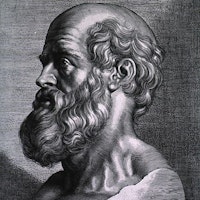It is more important to know what sort of person has a disease than to know what sort of disease a person has.
Hippocrates

What Sort of Person
Topic: Self-Cultivation & Health
It is more important to know what sort of person has a disease than to know what sort of disease a person has.
Hippocrates
Greek physician of the Classical period
Occupation
Physician
Born
Around 460 BC in Kos, Ancient Greece
Died
Around 370 BC in Larissa, Ancient Greece (approximately aged 90)
Hippocrates, born around 460 BC on the Greek island of Kos, is widely regarded as the "Father of Medicine." His contributions to the field were revolutionary, as he proposed that diseases were caused by natural factors rather than the wrath of gods. Hippocrates' approach was grounded in careful observation and logical reasoning, laying the foundation for modern medical practices. He established the Hippocratic School of Medicine on Kos, where he taught and practiced, emphasizing clinical observation and systematic categorization of diseases.
Throughout his life, Hippocrates traveled extensively, sharing his medical knowledge. His teachings and methods were compiled into the Hippocratic Corpus, although it is unclear how many texts were directly authored by him. The principles in these works, such as patient confidentiality and ethical practice, have had a lasting impact on the medical profession. Hippocrates' holistic treatment of patients, considering their environment, lifestyle, and diet, marked a significant departure from the superstitious practices that dominated medicine before his time.
One of Hippocrates' most enduring legacies is the Hippocratic Oath, a set of ethical guidelines for physicians still referenced and adapted today. The Oath emphasizes medical ethics, including the commitment to do no harm, maintain patient confidentiality, and treat patients with compassion and respect. Hippocrates' influence on medicine is profound, as his teachings continue to inspire and guide medical professionals worldwide. He passed away around 370 BC in Larissa, Greece, but his contributions to medicine have ensured that his legacy endures.
Hippocrates. Aphorisms by Hippocrates. Translated by Francis Adams, Wikisource, the free online library, 1849. [“Aphorisms by Hippocrates.” Translated by Francis Adams, Wikisource, the Free Online Library, Wikisource, 1849, en.wikisource.org/wiki/Aphorisms, [Hippocrates (460-370 B.C.)].

Hippocrates
Theme: Healing

About This Hippocrates Quotation [Commentary]
Hippocrates, often regarded as the “Father of Medicine,” emphasized the importance of understanding the patient holistically. His statement, “It is more important to know what sort of person has a disease than to know what sort of disease a person has,” highlights this belief. He recognized that an individual’s lifestyle, environment, and unique constitution play a critical role in their health. This approach, focusing on the patient rather than just the ailment, laid the groundwork for many principles in modern medicine and remains relevant today.
Hippocrates’ quote encourages a shift from a purely clinical view to a more comprehensive understanding of the patient. By considering the broader context of a patient’s life, healthcare providers can better tailor treatments to meet unique needs. This aligns with the concept of “healing,” where the goal is not just to treat symptoms but to restore overall well-being. Understanding a patient’s history, mental state, and social circumstances allows for more effective and compassionate care.
In contemporary medicine, Hippocrates’ principles are reflected in patient-centered care models, which prioritize the patient’s experiences, values, and preferences. This approach improves the quality of care and enhances the healing process, as patients feel seen and understood. Hippocrates’ wisdom reminds us that true healing goes beyond treating physical ailments, encompassing the entirety of the person’s life and being, essential for genuine health and well-being.
More aphorisms from Hippocrates:
Resources
Related Quotes
Copyright © 2017 – 2026 LuminaryQuotes.com About Us